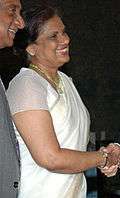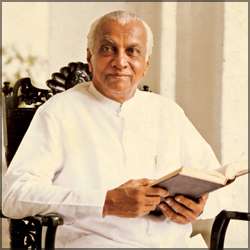1994 Sri Lankan parliamentary election
The Sri Lankan parliamentary election of 1994 marked the decisive end of 17 years of UNP rule and a revival of Sri Lankan democracy.
| |||||||||||||||||||||||||||||||
All 225 seats to the Parliament of Sri Lanka 113 seats were needed for a majority | |||||||||||||||||||||||||||||||
|---|---|---|---|---|---|---|---|---|---|---|---|---|---|---|---|---|---|---|---|---|---|---|---|---|---|---|---|---|---|---|---|
| Turnout | 76.24% | ||||||||||||||||||||||||||||||
| |||||||||||||||||||||||||||||||
 Winners of polling divisions. PA in blue and UNP in green. | |||||||||||||||||||||||||||||||
| |||||||||||||||||||||||||||||||
Background
Democracy in Sri Lanka had seemed doomed as the presidencies of J.R. Jayewardene and Ranasinghe Premadasa arbitrarily banned opposition parties, severely muzzled the media, and routinely used death squads, torture, and kidnappings in the two civil conflicts against the LTTE and JVP. The UNP had simply cancelled the 1983 parliamentary elections; its control of the media led it to victory in the 1988 and 1989 elections.
The population was increasingly tired of war and repression, worn out with jingoistic Sinhalese nationalism, and wanted a return to freedom, peace, and democracy. Chandrika Kumaratunga, leader of the Sri Lanka Freedom Party, formed a coalition with small leftist parties called the People's Alliance. This was in some ways a revival of her mother's coalition from the 1970s, but this time campaigning for rapprochement with the Tamils rather than their marginalization.
Results
The PA did not win a majority, but was able to govern with the support of the smaller parties.
Summary
Summary of the 1994 Sri Lankan parliamentary election[1]
Province
Electoral District
Elected members
Legacy
The 1994 election did not live up to its great hopes. The PA government was unable to come to an agreement with the LTTE, and ended up prosecuting war just as brutally as its UNP predecessor. The Executive Presidency, which Kumaratunga had promised to abolish, remains as powerful as ever.
Notes
- As Sri Lanka Freedom Party
- EPDP contested as an independent group in Jaffna District.
- The EROS/PLOTE/TELO alliance contested as TELO in Ampara District, Batticaloa District, Colombo District and Trincomalee District; as DPLF in Vanni District; and as in an independent group in Jaffna District.
- UCPF contested as an independent group in Nuwara Eliya District.
References
- "Result of Parliamentary General Election 1994" (PDF). Department of Elections, Sri Lanka.
- "Result of Parliamentary General Election 1994" (PDF). Department of Elections, Sri Lanka. Archived from the original (PDF) on 2010-10-06.
- "Table 40 Parliament Election (1994)". Sri Lanka Statistics. 10 February 2009.
- "Sri Lanka Parliamentary Chamber: Parliament Elections Held in 1994". Inter-Parliamentary Union.

